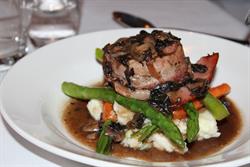"Let thy food be thy medicine..." Hippocrates
A person's immune system and their nutrition are closely related. Inadequacies in a person’s diet leads to lowered immunity, which in turn compromises the body’s response to an infection. Using food to establish a strong immune system reduces the risk of developing an infection. If an infection does take hold, food can be a powerful tool to support your body to fight the infection.
The number one thing to look for in a food to help maintain great health is a food the is nutritionally dense. This means food that contains a high quality nutrients, including macro nutrients (carbohydrates, proteins and fats), as well as micronutrients (vitamins and minerals).
Micronutrients play an important role in the formation of antibodies and development of the immune system, and deficiencies in certain micronutrients are linked to an increased susceptibility to infection. You can get a range of micronutrients from fresh, natural food sources. You may also like to supplement with high quality supplements (speak to a relevant health practitioner).
 Some of the different roles of micronutrients can be seen below, along with suggested food sources:
Some of the different roles of micronutrients can be seen below, along with suggested food sources:
-
Vitamin E is an antioxidant which scavenges free radicals in the body boosting the body’s defensive mechanisms. Foods high in Vitamin E include sunflower seeds, peanuts, dried apricots, avocados,tomatoes and sweet potatoes .
-
Vitamin C is another powerful antioxidant which has been shown to affect different metabolic processes and functioning of the immune system, such as the function of immune system cells like T cells. An increased intake of vitamin C has also been shown to increase the body’s resistance to infections such as the common cold. Good sources of vitamin C include citrus fruit, as well as many other fruits and vegetables.
-
Vitamin D is also implicated in the prevention of infections and is thought to affect the functioning of infection fighting B,T and antigen-presenting cells in the blood. The most important source of Vitamin D is sunlight while food sources include fortified foods and oily fish. People at most risk of Vitamin D deficiency are those who have limited exposure to sunlight such as people who are housebound or in an institution, these groups may therefore benefit from Vitamin D supplementation.
-
Zinc has also been shown to have essential functions in supporting a healthy immune system and zinc supplementation has had proven benefits in the treatment/ prevention of infections in patients with a deficiency of this mineral. Zinc is present in a wide range of foods including meat, fish, chicken, eggs, cheese and shellfish as well as in fortified foods such as breakfast cereals.
-
Iron is also associated with immunity and a deficiency of this mineral has been linked to impaired immunity, particularly in the elderly. Sources of iron include dried beans, eggs, dried fruit, iron fortified cereals, liver, and fish.
-
Iodine is a chemical element needed for normal metabolism and as with the previous micronutrients also affects the normal functions of the immune system. Iodine is found in egg and dairy products and also in high concentrations in seaweed.
Balancing your intake of nutrients can be as important as having an adequate intake. Zinc for example, cannot be absorbed as well into your body if you have excessively high levels of copper in your diet. Both are needed, but too much of one can affect how we deal with the other. Similarly, there is a relationship between calcium and sodium; and other relationships between other micronutrients.
Find our more about healing yourself naturally here.